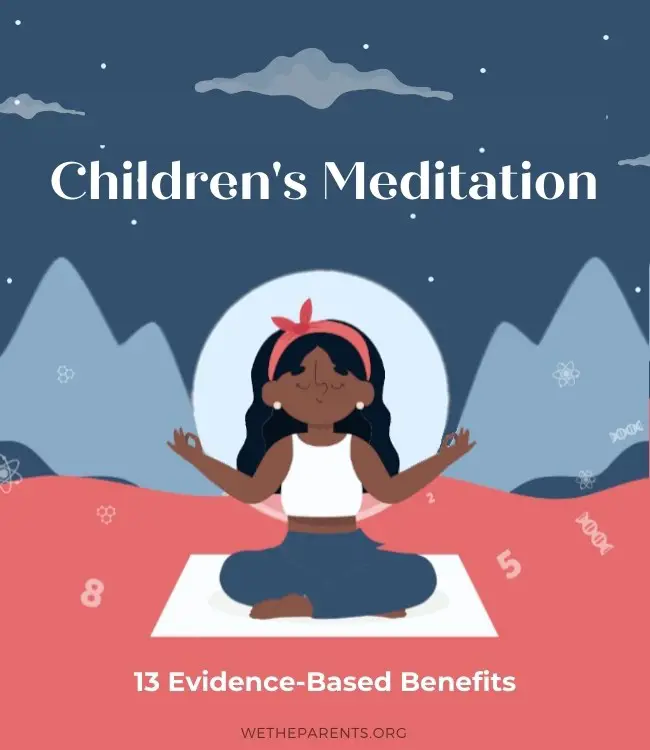When life is hectic and time is needed to unwind, many adults turn to the proven benefits of meditation.
But what about children, who face their own set of stresses?
According to the literature (which is rapidly growing), meditation for kids can be advantageous in fascinating and unexpected ways.
Scientific studies are unearthing associations between meditation and emotional, cognitive, and behavioral benefits.
Let’s examine the evidence.
The Infographic

The effect of meditation on children: Examining the evidence
These 13 research-backed benefits of childhood meditation include aspects of personal growth, emotional health, and even cognitive function, including positive impact on the symptoms of ADHD. Let’s dive in!
1) Improves sense of self
Developing a healthy sense of self-esteem is an important part of childhood socialization, as it impacts a child’s ability to assert themselves in a healthy way and feel appropriate levels of pride and confidence. Struggling with self-esteem and identity is common in childhood, as the forming of social groups is often rife with bullies and critics until good friends are found.
As one study discovered, time spent getting in touch with their thoughts and emotions through meditation can have a positive impact on a child’s self esteem and identity. When meditation education was introduced into Melbourne Catholic schools in a study on childhood spirituality, assessments of participants determined that meditation can help to improve a child’s sense of self.
Key study/paper: De Souza, Marian, Brendan Hyde, and Tanya Kehoe. “An investigation into the effects of meditation with children in a Catholic primary school.” International Journal of Children’s Spirituality 19.3-4 (2014): 197-212.
2) Reduces stress and anxiety at school
School may not always feel like a welcoming environment for some children. Social pressure, struggling to fit in, difficulty with schoolwork, inability to focus, and anxiety during tests are only a few of many possible reasons that the classroom can become a stressful place for kids — what’s key is finding healthy ways to ease that stress and anxiety, making school a positive place once again.
Meditation, which has been associated in numerous scientific studies with the relief of anxiety and stress, is likely to be a useful coping tool in dealing with negative feelings about school. A meta-analysis on the benefits of teaching mindfulness to children identified a less stressful and anxious school environment as a benefit of meditation.
Key study/paper: Hooker, Karen E., and Iris E. Fodor. “Teaching mindfulness to children.” Gestalt review 12.1 (2008): 75-91.
3) Helps kids handle times of crisis
The ability to cope with day-to-day stress and disappointment is one kids cultivate through experience, but handling an actual crisis — 2020’s COVID-19 pandemic for example — is something that most kids don’t have an emotional tool kit for. Crisis can provoke many emotions for children, from grief and powerlessness to anger and frustration, and they’re likely to look to adults they trust for ways to manage these significant feelings.
One aspect of meditation is mindfulness, which refers to relinquishing control over thoughts and feelings and simply allowing them to flow through the mind and be processed calmly; through practice, mindfulness can be used to relieve stress during tough times over which we feel powerless. A meta-analysis on the benefits of meditation and mindfulness identified its stress-reduction capabilities as a positive mental health tool for kids facing acute crisis situations.
Key study/paper: Behan, C. “The benefits of meditation and mindfulness practices during times of crisis such as COVID-19.” Irish journal of psychological medicine 37.4 (2020): 256-258.
Source: cambridge.org/core/journals/benefits-of-meditation
4) Lowers feelings of anger
Frustration and anger are a part of life, but we all learn to cope with them through experience; kids, who don’t have a lifetime of minor frustrations behind them, are a bit more likely to fly off the deep end when something frustrates them. Some children are naturally more calm and resilient, but those who are quicker to anger and harder to soothe can benefit from learning tools for coping with their anger while they’re still kids.
One of the most commonly noted benefits of meditation is feelings of calm, so it makes a good deal of sense that scientific study has correlated meditation with a reduction in feelings of anger. When a meditation program was introduced to 31 Catholic schools in Australia in a study on its benefits, a reduction in feelings of anger was a consistently reported effect of participation.
Key study/paper: Campion, Jonathan, and Sharn Rocco. “Minding the mind: the effects and potential of a school-based meditation programme for mental health promotion.” Advances in school mental health promotion 2.1 (2009): 47-55.
Source: tandfonline.com/doi/abs/10.1080…
5) Bolsters coping skills
When something tough comes up — a bad grade on a test, or a cancelled sleepover, for example — some children handle the disappointment better than others. For kids who are a bit more reactionary and find it hard to overcome these knocks, practicing strategies for processing and controlling emotions can help kids to cope with the natural disappointments and sadnesses we all must face occasionally.
The use of mindfulness in meditation can help children to process and release difficult emotions in a quiet, soothing setting, helping them to better cope with what they’re feeling. In a meta-analysis of the benefits of meditation as a health and behavioral intervention for students, meditation was identified as a way to enhance coping skills.
Key study/paper: Wisner, Betsy L., Barbara Jones, and David Gwin. “School-based meditation practices for adolescents: A resource for strengthening self-regulation, emotional coping, and self-esteem”Children & Schools 32.3 (2010): 150-159.
6) Encourages inclusivity and cooperation
The more inclusive and accepting we are of one another, the more we learn and the more we accomplish; learning this lesson at an early age is something that will pay off handsomely throughout a child’s life.
As children study and play in diverse environments that encourage calm and emotional awareness, the likelihood that they’ll cooperate and be open to interacting with others increases. When meditation education was introduced into Melbourne Catholic schools in a study on childhood spirituality, it was noted that participation in the program resulted in more inclusive and cooperative behavior during follow-up learning activities.
Key study/paper: De Souza, Marian, Brendan Hyde, and Tanya Kehoe. “An investigation into the effects of meditation with children in a Catholic primary school.” I International Journal of Children’s Spirituality 19.3-4 (2014): 197-212.
7) Increases focus
Staying on task can be a tough proposition for any child from time to time, but some face particular difficulty with attentiveness in the classroom. Finding ways to slow down, stay calm, and clear their mind can often help kids who struggle with focus to keep their mind on what they’re trying to accomplish.
The mindfulness aspect of meditation, which encourages free thinking without distraction, is particularly good at helping to improve focus over time. When a meditation program was introduced to 31 Catholic schools in Australia in a study on its benefits, one oft-reported benefit was an increase in ability to focus.
Key study/paper: Campion, Jonathan, and Sharn Rocco. “Minding the mind: the effects and potential of a school-based meditation programme for mental health promotion.” Advances in school mental health promotion 2.1 (2009): 47-55.
8) Helps children to self-regulate
When a young child has a sudden surge of emotion — joy, excitement, anger, fear, sadness — their instinct is not to calm down and self-regulate. They learn to meter these reactions and feelings as they grow toward cognitive and emotional maturity, and one of the first steps is being able to self-soothe when they’re feeling upset.
Using meditation as a tool for processing emotions can be helpful, as mindfulness encourages the processing and release of thoughts as they occur in a calm, non-judgemental manner. In a meta-analysis of the benefits of meditation as a health and behavioral intervention for students, an improved ability to self-regulate emotionally was identified as a likely benefit of meditation.
Key study/paper: Wisner, Betsy L., Barbara Jones, and David Gwin. “School-based meditation practices for adolescents: A resource for strengthening self-regulation, emotional coping, and self-esteem.” Children & Schools 32.3 (2010): 150-159.
9) Fosters better sleep patterns
Bless the lucky parents whose little ones don’t beg for another glass of water, bedtime story, trip to the bathroom — do they exist? When your child has a tough time sleeping, it likely means you do too, which doesn’t spell happy mornings or functional routines for anyone.
If you’re the parent of a child with ADHD, there’s a nearly three in four chance your child is dealing with a sleep disorder[1], but meditation may be able to help. After a six week program of biweekly Sahaja Yoga Meditation sessions intended as a family treatment method for children with ADHD, participating children reported better sleep patterns as a benefit.
Key study/paper: Harrison, Linda J., Ramesh Manocha, and Katya Rubia. “Sahaja yoga meditation as a family treatment programme for children with attention deficit-hyperactivity disorder.” Clinical Child Psychology and Psychiatry 9.4 (2004): 479-497.
10) Eases ADHD symptoms
When your child receives an ADHD diagnosis, life becomes about routines and symptom management. It sounds simple enough, but keeping track of their academic progress and emotional and social well-being is a massive undertaking, and finding ways to help them cope becomes top priority.
In addition to streamlining your habits at home and following advice from your child’s teachers and doctors, the calm and focus associated with meditation make it a viable strategy for easing the symptoms of ADHD. In a meta-analysis of the benefits of meditation as a health and behavioral intervention for students, improvement of ADHD symptoms such as lack of focus and forgetfulness was identified as a benefit of meditation.
Key study/paper: Wisner, Betsy L., Barbara Jones, and David Gwin. “School-based meditation practices for adolescents: A resource for strengthening self-regulation, emotional coping, and self-esteem.”Children & Schools 32.3 (2010): 150-159.
Source: academic.oup.com/cs/article-abstract/32/3/150/406211?
11) Enhances relationship quality
Forming friendships and creating deep family bonds is an important part of childhood social development. For kids with ADHD, relationship quality can sometimes be impacted by symptoms of their disorder; inability to focus on a conversation, interrupting, and impulsive behavior can all have a negative impact socially.
A study correlating meditative yoga with the successful alleviation of ADHD symptoms noted a better social life as an associated benefit. After a six week program of biweekly Sahaja Yoga Meditation sessions intended as a family treatment method for children with ADHD, those who participated reported improvements to relationship quality.
Key study/paper: Harrison, Linda J., Ramesh Manocha, and Katya Rubia. “Sahaja yoga meditation as a family treatment programme for children with attention deficit-hyperactivity disorder.” Clinical Child Psychology and Psychiatry 9.4 (2004): 479-497
Source: journals.sagepub.com/doi/abs/10.1177/1359104504046155
12) Creates feelings of calm and relaxation
As parents, we’re deeply familiar with the need to relax, unwind, and calm down. It can be hard to imagine that our little ones feel the same, but they too experience stress — it can come in the form of a bad day, emotional overstimulation, or any number of other factors, and coping tools can help them to feel relaxed when they’re overwhelmed.
One of meditation’s most frequently lauded benefits is its ability to make those who engage feel calmer and more relaxed, and as one study proves, kids are no exception. When a meditation program was introduced to 31 Catholic schools in Australia in a study on its benefits, increased feelings of calm and relaxation were frequently reported by participants.
Key study/paper: Campion, Jonathan, and Sharn Rocco. “Minding the mind: the effects and potential of a school-based meditation programme for mental health promotion.”Advances in school mental health promotion 2.1 (2009): 47-55.
13) Minimizes conflict at school
The occasional disagreement is a natural occurrence in social settings among people of any age, but when your child is repeatedly getting into arguments or scraps at school, it’s a sign that something is amiss. Conflict at school is one issue commonly associated with ADHD, as disruptive, impulsive, and aggressive behavior can sometimes escalate a minor disagreement into something more significant.
A study linking the benefits of meditative yoga in the treatment of ADHD in children discovered that a decrease in these incidents was a positive result of meditation. After a six week program of biweekly Sahaja Yoga Meditation sessions intended as a family treatment method for children with ADHD, participants reported a reduction in conflicts at school as a benefit.
Key study/paper: Harrison, Linda J., Ramesh Manocha, and Katya Rubia. “Sahaja yoga meditation as a family treatment programme for children with attention deficit-hyperactivity disorder.” Clinical Child Psychology and Psychiatry 9.4 (2004): 479-497.
Source: journals.sagepub.com/doi/abs/10.1177/1359104504046155
And so…
Having been used for millennia as a way to restore calm, process emotions, and connect with one’s spirituality, meditation is a tool with clear benefits to people of any age. As scientific studies make clear, when a place for meditation is made in the classroom, children see benefits in the form of better self-esteem, fewer emotional issues, and even a reduction in ADHD symptoms.
Starting at home with “mindfulness time” or a calming meditation corner is a great way to kick off this journey for younger kids, while older ones might be more into trying guided meditations on YouTube, even engaging as a whole family. Happy meditating!








